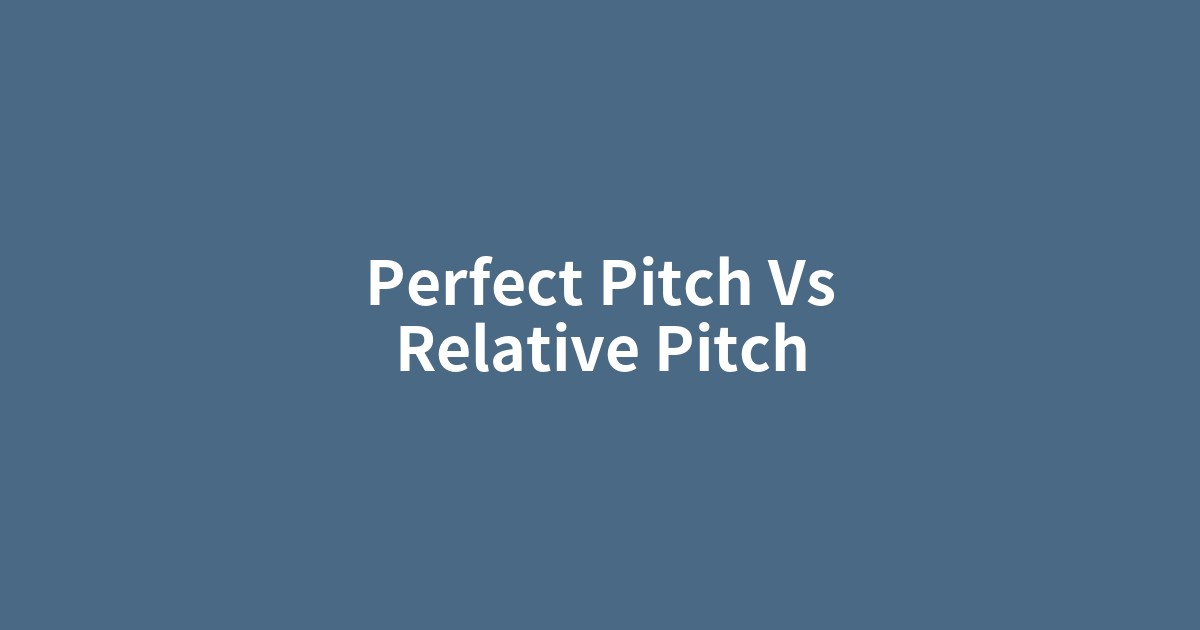このページは、歴史や文化の物語を楽しみながら、その文脈の中で重要な英単語を自然に学ぶための学習コンテンツです。各セクションの下にあるボタンで、いつでも日本語と英語を切り替えることができます。背景知識を日本語で学んだ後、英語の本文を読むことで、より深い理解と語彙力の向上を目指します。

音を「ド」や「ソ」といった音名で直接認識できる「絶対音感」。そのability(能力)は生まれつきか、訓練で身につくのか。その科学に迫ります。
この記事で抑えるべきポイント
- ✓絶対音感は音を直接的な音名(ド、レ、ミなど)で認識する能力であり、相対音感は基準音との音程(距離)で音を認識する能力であるという根本的な違い。
- ✓絶対音感の習得には、遺伝的素因と幼少期の「臨界期」における聴覚訓練が大きく関わっているという見方が有力であること。
- ✓脳科学的には、絶対音感保有者の脳は非保有者と比べ、音を処理する際の活動領域やパターンに違いが見られる可能性があること。
- ✓絶対音感は、正確な演奏などに役立つ一方、基準ピッチから外れた音楽を不快に感じるなどのデメリットも存在し、必ずしも音楽的成功の絶対条件ではないこと。
- ✓相対音感は、多くの音楽家が訓練によって習得・活用しており、音楽活動において非常に重要かつ普遍的な能力であること。
絶対音感と相対音感 ― 音を聴き分ける能力の科学
ふと耳にしたメロディーの音階を即座に言い当てられる人がいます。この「絶対音感」と呼ばれる能力は、一体どのようにして身につくのでしょうか。本記事では、絶対音感と、多くの音楽家が頼りにする「相対音感」との違いから、その能力が遺伝によるものか、あるいは訓練の賜物なのかという長年の謎に、最新の科学的知見を交えて迫ります。
The Science of Pitch Recognition: Absolute vs. Relative Pitch
Some people can instantly name the notes of a melody they happen to hear. How is this ability, known as "absolute pitch," acquired? This article delves into the long-standing mystery of whether this skill is a product of genetics or training, exploring the differences between absolute pitch and the "relative pitch" that many musicians rely on, all through the lens of modern scientific knowledge.
絶対音感と相対音感 ― 根本的な違いとは?
まず、二つの音感の定義を明確にしましょう。「絶対音感(absolute pitch)」とは、基準となる音がなくても、聞こえてきた音を直接「ド」や「ソ」といった音名で認識できる能力です。例えるなら、色を見て即座に「赤」や「青」と答えるようなもの。一方、「相対音感(relative pitch)」は、ある基準の音との関係性、つまり音程(音の高さの距離)で音を認識する能力です。最初の音が「ド」だと分かれば、次の音がそれよりどれくらい高いか低いかを判断し、「ミ」や「ファ」と認識します。この違いは、音楽の聴き方や演奏、作曲の方法にまで深く影響を及ぼします。
Absolute Pitch and Relative Pitch: What's the Fundamental Difference?
First, let's clarify the definitions of these two types of pitch perception. "Absolute pitch" is the ability to identify a note, such as "C" or "G," directly upon hearing it, without any reference tone. It's like seeing a color and immediately knowing it's "red" or "blue." In contrast, "relative pitch" is the ability to recognize notes based on their relationship to a reference note, specifically the interval (the distance in pitch) between them. If you know the first note is a "C," you can determine if the next note is higher or lower and identify it as an "E" or "F." This difference profoundly affects how we listen to, perform, and compose music.
能力の源泉 ― 遺伝か、環境か?
絶対音感はどのようにして身につくのでしょうか。この問いに対する最も有力な説は、幼少期における「臨界期(critical period)」の存在です。脳の可塑性が高い特定の時期に、適切な聴覚訓練を受けることで、音のラベル付け能力が定着すると考えられています。しかし、誰もが訓練すれば身につくわけではないようです。近年の研究では、絶対音感の保有には特定の「遺伝的(genetic)」な素因が関わっている可能性が指摘されています。つまり、生まれ持った素質と、幼少期の環境要因が複雑に絡み合って、この特別な能力が発現すると考えられているのです。
The Source of the Ability: Genetic or Environmental?
How is absolute pitch developed? The most prominent theory points to the existence of a "critical period" in early childhood. It is believed that during this specific time of high brain plasticity, the ability to label notes can be established through appropriate auditory training. However, it seems not everyone can develop it just through practice. Recent studies suggest that a specific "genetic" predisposition may be involved in possessing absolute pitch. In other words, this special ability is thought to emerge from a complex interplay between innate talent and environmental factors during childhood.
脳科学が解き明かす「音感」のメカニズム
音感の違いは、単なる「耳の良さ」の問題ではありません。「認知科学(cognitive science)」の観点から見ると、それは脳における情報処理プロセスの違いに他なりません。音は物理的には空気の振動、すなわち「周波数(frequency)」として耳に届きます。絶対音感を持たない人の脳は、主に音と音の関係性を処理するのに対し、絶対音感保有者の脳は、個々の音の周波数を長期記憶に保存された音名と直接結びつける、特有の処理を行っていると考えられています。この音響情報に対する「認識(perception)」の仕方の違いが、絶対音感の核心にあるのです。
Neuroscience Unravels the Mechanism of "Pitch Sense"
The difference in pitch sense is not merely a matter of having a "good ear." From the perspective of "cognitive science," it is nothing less than a difference in the brain's information processing. Sound physically reaches the ear as vibrations in the air, or "frequency." While the brains of those without absolute pitch primarily process the relationships between notes, the brains of absolute pitch possessors are thought to perform a unique process, directly linking the frequency of individual notes to pitch names stored in long-term memory. This difference in the "perception" of auditory information lies at the core of absolute pitch.
絶対音感の光と影、そして相対音感の普遍性
絶対音感は、正確な音程での演奏や聴音(耳コピー)において絶大な力を発揮します。しかし、その鋭敏さゆえのデメリットも存在します。例えば、基準となるピッチからわずかにずれた楽器の音を不快に感じたり、移調された楽曲に強い違和感を覚えたりすることがあります。一方で、相対音感は、ほとんどの人が訓練によって後天的に「習得(acquire)」可能な能力です。移調やハーモニーの理解に不可欠であり、音楽を豊かに表現するための普遍的な「能力(ability)」として、あらゆる音楽家にとって極めて重要です。絶対音感は必ずしも音楽的成功の絶対条件ではないのです。
The Pros and Cons of Absolute Pitch and the Universality of Relative Pitch
Absolute pitch is incredibly powerful for tasks like playing with precise intonation or transcribing music by ear. However, this very sensitivity can have its downsides. For instance, individuals may find the sound of instruments slightly out of tune to be unpleasant or feel a strong sense of dissonance with transposed music. On the other hand, relative pitch is an ability that most people can "acquire" through training. It is essential for understanding transposition and harmony, making it a universal "ability" for richly expressing music and is critically important for all musicians. Absolute pitch is not necessarily a prerequisite for musical success.
結論
絶対音感と相対音感は、それぞれが異なる特性と価値を持つ、音を捉えるためのユニークな方法です。一方が他方より優れているという単純な結論は存在しません。むしろ、音楽を深く理解し、楽しむための多様な「聴覚(auditory)」の在り方があることを示唆しています。この記事を通じて、あなたが普段何気なく聴いている「音」に対する認識を、新たな視点で見つめ直すきっかけとなれば幸いです。
Conclusion
Absolute and relative pitch are unique ways of perceiving sound, each with its own distinct characteristics and value. There is no simple conclusion that one is superior to the other. Instead, it suggests that there are diverse forms of "auditory" processing that allow us to deeply understand and enjoy music. Hopefully, this article will provide you with a new perspective to re-examine the "sounds" you listen to in your daily life.
テーマを理解する重要単語
interval
音楽用語の「音程」と、一般的な「間隔」の両方を意味します。記事では、相対音感が二つの音の高さの隔たり、つまり「音程」を認識する能力であることを説明するために不可欠です。この単語を知ることで、相対音感の定義がより明確になります。
文脈での用例:
There will be a 20-minute interval between the two acts of the play.
劇の2つの幕の間に20分間の休憩があります。
acquire
「(努力して)習得する」という意味の動詞です。記事では、相対音感が訓練によって後天的に「習得可能」な能力であることを示すために使われています。生まれつきの要素が強い絶対音感との対比を明確にする上で重要な単語です。
文脈での用例:
He believed that essential skills for success could be acquired.
彼は、成功に不可欠なスキルは習得できるものだと信じていました。
ability
「能力」を意味しますが、単なる技術(skill)だけでなく、潜在的な力や才能も含む広い言葉です。記事では、相対音感が音楽を豊かに表現するための普遍的な「能力」として論じられており、音楽的成功における多様な資質を示唆しています。
文脈での用例:
She has a remarkable ability to calm angry people.
彼女には怒っている人々をなだめる驚くべき能力がある。
genetics
「遺伝か、環境か?」という記事の大きな問いに直結する単語です。絶対音感が生まれ持った才能なのか、後天的な訓練の賜物なのかを論じる上で中心的な役割を果たします。科学的な議論の背景を理解するために不可欠な言葉と言えるでしょう。
文脈での用例:
Advances in genetics have led to new treatments for many diseases.
遺伝学の進歩は、多くの病気に対する新しい治療法につながった。
perception
「知覚」や「認識」と訳され、単に情報を受け取るだけでなく、脳がそれを解釈し意味を理解するプロセスを指します。音感の違いは、音響情報に対するこの「認識」の仕方の違いである、という記事の核心的な主張を理解する鍵です。
文脈での用例:
There is a general perception that the economy is improving.
経済は改善しつつあるという一般的な認識がある。
frequency
音を物理的に説明する「周波数」と、日常で使う「頻度」という二つの意味を持つ重要単語です。記事では、音の正体が空気の振動(周波数)であることを示し、絶対音感のメカニズムを科学的に理解する上で、この基本概念は欠かせません。
文脈での用例:
The frequency of the sound determines its pitch.
音の周波数がその高さを決定します。
interplay
「相互作用」や「絡み合い」を意味し、二つ以上の要素が互いに影響し合う複雑な関係性を表現するのに適した言葉です。記事では、絶対音感の発現が「遺伝的素質」と「幼少期の環境」の複雑な相互作用によるものだという説を説明しています。
文脈での用例:
The report examines the complex interplay between genetics and environment.
その報告書は、遺伝と環境の間の複雑な相互作用を調査している。
predisposition
「素因」や「傾向」を意味し、ある特定の状態になりやすい性質を指します。記事では、絶対音感の保有には単なる訓練だけでなく、生まれ持った「遺伝的素因」が関わっている可能性を示唆する文脈で使われ、議論に深みを与えています。
文脈での用例:
She has a genetic predisposition to heart disease.
彼女は心臓病になりやすい遺伝的素因を持っている。
absolute pitch
この記事の主題そのものである「絶対音感」を指す最重要語です。基準音なしに音名を特定できるこの特殊な能力が、遺伝と環境のどちらに起因するのかを探る旅の出発点となります。この単語の理解なくして、記事全体の読解は成り立ちません。
文脈での用例:
She has absolute pitch and can identify any note she hears.
彼女は絶対音感を持っており、聞いた音を何でも特定できます。
relative pitch
「絶対音感」と対比される、もう一方の主要概念「相対音感」です。基準の音との関係性で音を認識する能力を指し、多くの音楽家がこの能力に依存しています。両者の違いを把握することが、この記事の核心を理解する上での鍵となります。
文脈での用例:
Most musicians develop excellent relative pitch through years of practice.
ほとんどの音楽家は、長年の練習を通じて優れた相対音感を養います。
critical period
「臨界期」と訳され、脳の発達において特定の能力が獲得されやすい決定的な時期を指します。記事では、絶対音感が幼少期のこの期間における聴覚訓練と深く関連しているという有力な仮説を説明するために用いられています。
文脈での用例:
There is a critical period for language acquisition in early childhood.
幼児期には言語習得のための臨界期があります。
cognitive science
「認知科学」を指し、知覚や思考、記憶といった人間の情報処理プロセスを研究する学問分野です。この記事では、音感の違いを単なる「耳の良さ」ではなく、脳における情報処理プロセスの違いとして捉える科学的な視点を提供しています。
文脈での用例:
Cognitive science explores the nature of the human mind and intelligence.
認知科学は、人間の心と知性の本質を探求します。
auditory
「聴覚の」という意味の専門的な形容詞です。視覚を意味する "visual" の対になる言葉として覚えておくと便利です。この記事では、音感という「聴覚」に関する現象を科学的に分析する文脈で使われ、議論の専門性を高めています。
文脈での用例:
The auditory system is responsible for our sense of hearing.
聴覚系は私たちの聴覚を司っています。